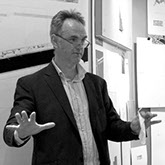
B Arch., Dip Arch (MSA), PhD (Edinburgh)
University of Edinburgh
School of Architecture and Landscape
Senior Lecturer
Architectural Design and Theory
Programme Director
MSc Architectural and Urban Design
M.Arch Integrated Pathway
MSc Reflective Design Practices
PhD Architecture (By Design)
dorian.wiszniewski@ed.ac.uk
+44 (0) 131 650 2311
RESEARCH INTERESTS
These are some of my research and PG supervisory interests. I invite PhD and other PG applicants who may be interested in pursuing the intersection between design and philsophical practices. I am particularly interested in PhD by Design applicants.
The Other
Levinas conceives of a particular dynamic to how we conceive and practice political relations. This is informative to how we might consider the role of architecture as a generator of relationships. Levinas speaks of proximity, “the proximity of person to person, the proximity of one’s neighbour or the welcome we prepare for one another" [Outside The Subject]. However, as Levinas leads us to ponder, is there an architecture that can provide a welcome and hosting to an unknown guest? This involves architectural exploration that cannot be derived from ready-made cultural expressions, identity concepts or the prejudices of a dominant host culture.
Borderlands
My Borderlands studios (in Budapest, Istanbul and Shanghai) have investigated specific socio-political and architectural "limits." 'Borderlands' are seen less as the effect of undesirable tension between opposing forces and, once 'otherness' is seen as the paradigmatic place of departure (Bhabha, Habermas, Levinas, Agamben, Nancy and Blanchot), more as places of potentiality for politico-philosophical exchange and richly energized architectural expression.
Curating The City
Apparatuses of narrative [Bertolt Brecht, Brecht On Theatre, The Development Of An Aesthetic] are employed to configure and frequently prescribe the role and relations between curator, architect, artist, scientist, critic and public. However, are the practices of Architecture and the Museum guilty of privileging themselves, especially over the ordinary, so as to protect culture and humanity from the un-theorized, un-valued, non-aesthetic, non-scientific, vulgar, prosaic and spiritually contaminated everyday?
Curating The City promotes a critical exchange between the narrative apparatuses of Architecture and the Museum. It initiates this exchange through an elaboration of two assertions: 1) There is a curatorial basis to the procedures of both Architecture and the Museum; and 2) The curatorial projects of both Architecture and Museum mediate everyday and special narratives of life.
Ecosophy
Ecosophy approaches ecology from a deep philosophical understanding of the inter-relation between the environment, social practices and human subjectivity (“the three ecologies”, Guattari, 2000). Therefore, rather than accepting a dialectical separation between urbanity and landscape, between people and landscape, man and nature, I am interested as much in how the city is an effect of landscape as the landscape is an effect of the urban.
Ecosophy tackles head-on the various crises and threats brought to bear on local value systems by global markets. However the purpose of my research-led design and design-led research is to find positive means by which the “incorporeal species” of creative production, (the poetics of materiality), re-evaluate existing, while developing the potential of new, ‘existential territories’. (constructions of social practice).
RESEARCH SUPERVISION (PhD By Design)
Maria Mitsoula, "A Section Through The Metropolitan Landscape of Athens"
Hsiao-Wei Lee, "Contemporary Kaohsiung, an architectural project in translation"
Mark Hilley, "The post-industrial landscape of Scotland"
Chris French, "A Rake's Progress - Designs for a Failed Institution."
© city|speculations 2020
